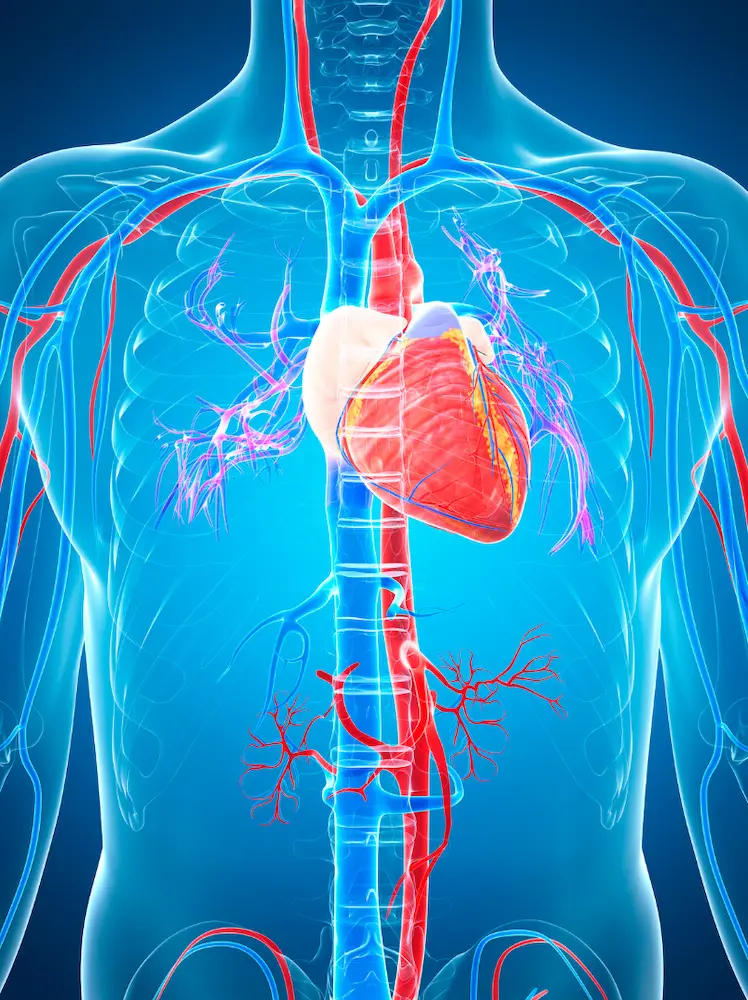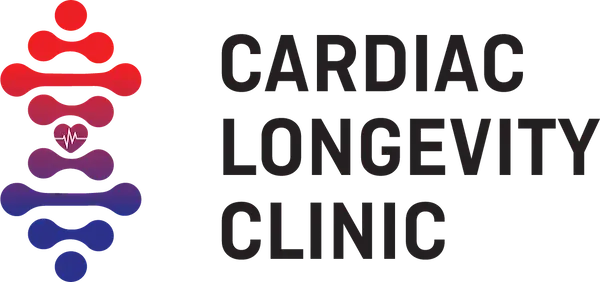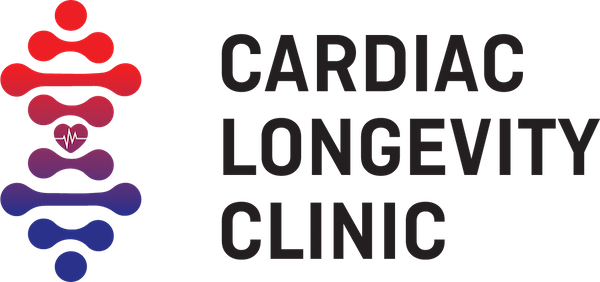Cardiovascular Health: How to Improve and Protect Your Heart

Your heart and blood vessels form the foundation of your overall health, powering every organ and function in your body. Maintaining cardiovascular health is essential for longevity and quality of life, helping you stay active, energized, and resilient.
Proactively managing your heart health can prevent serious conditions like heart disease and stroke. On this site, you’ll discover:
- Major risk factors that can impact your heart health.
- Prevention tips to keep your cardiovascular system strong.
- Innovative treatments that offer hope and recovery for those at risk.
Your heart health is in your hands—prioritize it today for a healthier tomorrow.
Understanding Cardiovascular Health and Disease
The heart, a muscular organ, pumps blood throughout the body and:
- Delivers oxygenated blood from the lungs to the body (via the left side of the heart).
- Pumps deoxygenated blood from the body to the lungs for oxygenation (via the right side).
- Maintains blood pressure and ensures continuous circulation.
Blood Vessels
The blood vessels form a network that carries blood throughout the body:
- Arteries: Carry oxygen-rich blood away from the heart.
- Veins: Return oxygen-poor blood to the heart.
- Capillaries: Enable the exchange of oxygen, carbon dioxide, nutrients, and waste.
Blood
Blood performs vital functions, including:
- Transport: Carries oxygen, nutrients, hormones, and waste.
- Regulation: Maintains body temperature, pH balance, and fluid levels.
- Protection: Provides immune defense and clotting ability.
Together, these components sustain life, deliver essential substances, and remove waste.

Understanding Cardiovascular Disease
Cardiovascular disease (CVD) refers to conditions that affect the heart and blood vessels. It is the leading cause of death globally, but understanding its causes and prevention can significantly reduce risk.


Coronary Artery Disease (CAD)
CAD occurs when arteries supplying blood to the heart narrow or become blocked due to plaque buildup (atherosclerosis). This can result in:
- Chest pain (angina): Reduced blood flow to the heart.
- Heart attack: Complete blockage of blood flow to the heart muscle.
- Heart failure: Long-term damage from an inadequate blood supply.
For more, visit the Heart and Stroke Foundation of Canada or the American Heart Association (AHA).
Stroke
A stroke happens when the brain’s blood supply is interrupted:
- Ischemic stroke: Blockage in a blood vessel.
- Hemorrhagic stroke: Rupture of a blood vessel, causing bleeding.
Strokes can cause brain damage, disability, or death. Early intervention is critical—learn the signs of stroke from the Canadian Stroke Best Practices or the European Stroke Organisation (ESO).
Heart Failure
Heart failure occurs when the heart cannot effectively pump blood to meet the body’s needs. Symptoms include:
- Shortness of breath during mild activity.
- Fatigue and weakness.
- Swelling in legs, ankles, or feet.
For guidance, visit the Canadian Cardiovascular Society (CCS) or the American College of Cardiology (ACC).
Risk Factors for Cardiovascular Disease
Understanding risk factors empowers you to take control of your heart health.
Non-Modifiable vs. Modifiable Factors
- Non-Modifiable: Age, sex, and genetics.
- Modifiable: Lifestyle choices, such as controlling blood pressure, managing diabetes and cholesterol, quitting smoking, and staying active.
For more, visit the Heart and Stroke Foundation of Canada or the American Heart Association (AHA).
Specific Risk Factors
High Blood Pressure (Hypertension)
Hypertension is a major risk factor for heart disease and stroke. Nearly half of American adults have high blood pressure, according to the AHA.
What You Can Do: Monitor blood pressure, reduce sodium, and follow your doctor’s advice.
Learn more from the CDC.
DIABETES
Diabetes increases heart disease risk 2-4 times. High blood sugar damages blood vessels and heart-controlling nerves.
What You Can Do: Maintain healthy blood sugar levels with diet, exercise, and medication.
Visit the Canadian Diabetes Association.
HIGH CHOLESTEROL
Elevated LDL cholesterol leads to arterial plaque buildup. Adults 20+ should check cholesterol every 4-6 years, per the CDC.
What You Can Do: Eat healthier, exercise, and take medications if needed.
See the American College of Cardiology.
SMOKING
Smoking damages blood vessels, increases clot risk, and reduces oxygen in blood. Smokers are 2-4 times more likely to develop heart disease, per the WHO.
What You Can Do: Quit smoking.
Many resources, such as SmokeFree.gov, can help.
Lifestyle Changes to Improve Cardiovascular Health
Diet and Nutrition for Heart Health
Adopting a nutrient-rich diet supports heart health.
Heart-Healthy Foods
- Whole grains: Lower LDL cholesterol.
- Leafy greens: Provide antioxidants and vitamin K.
- Lean proteins: Supply nutrients without unhealthy fats.
- Healthy fats: Found in avocados, nuts, and olive oil.
See more on Longevity Optimized Diets.
Foods to Avoid
- Trans fats: Found in processed snacks and fried foods.
- High sodium: Increases blood pressure.
- Processed sugars: Contribute to obesity and inflammation.


Physical Activity Recommendations
Cardio Exercises
The AHA recommends:
- 150 minutes of moderate-intensity aerobic activity weekly (e.g., walking, cycling).
- OR 75 minutes of vigorous-intensity activity (e.g., jogging, HIIT).
Strength Training
Incorporate resistance exercises twice a week to:
- Improve circulation.
- Maintain muscle strength.
Managing Stress and Getting Quality Sleep
Stress Reduction Techniques
Chronic stress increases blood pressure and inflammation. Try:
- Mindfulness meditation.
- Breathing exercises.
- Taking regular breaks.
Explore more on Stress and Longevity.
Sleep for Heart Health
Aim for 7-9 hours of sleep per night to reduce hypertension and support heart function.

Advanced Treatment Options and Research Innovations
Exciting advancements are transforming cardiovascular care.
Recent Cardiovascular Research
PCSK9 Inhibitors
These medications lower LDL (“bad”) cholesterol by enhancing the liver’s ability to remove it.
Clinical Evidence: Reduced cardiovascular events by 15-20%, per the New England Journal of Medicine. PCSK9 inhibitors are particularly effective for individuals who do not respond well to traditional statin therapy or have genetic conditions like familial hypercholesterolemia.
For more information, visit trusted sources like AHA.
SGLT-2 Inhibitors
Initially developed for diabetes, these drugs now treat heart failure and protect heart function.
Clinical Evidence: SGLT-2 inhibitors block the reabsorption of glucose in the kidneys, leading to increased glucose excretion. This process has been shown to improve heart function, reduce fluid overload, and protect the heart against further damage.
Large trials such as DAPA-HF and EMPEROR-Reduced have demonstrated that SGLT-2 inhibitors significantly reduce the risk of hospitalization and death from heart failure. They are now considered a cornerstone therapy for patients with heart failure with reduced ejection fraction (HFrEF).
Learn more from the Journal of the American College of Cardiology (JACC).
Minimally Invasive Procedures: Transcatheter Edge-to-Edge Repair (TEER)
For patients with mitral valve regurgitation, Transcatheter Edge-to-Edge Repair (TEER) offers a minimally invasive alternative to open-heart surgery. This innovative procedure involves using a catheter to place a small clip on the mitral valve, improving its ability to close properly and reducing blood leakage.
Key Benefits: TEER is ideal for patients who are at high surgical risk and has been shown to improve symptoms, heart function, and overall quality of life.
Clinical Evidence: Studies published in the Journal of the American Medical Association (JAMA) report that TEER significantly reduces hospitalization rates and improves survival in patients with severe mitral regurgitation.
For more information on minimally invasive procedures, visit the American College of Cardiology (ACC) or the National Heart, Lung, and Blood Institute (NHLBI).
Importance of Regular Screenings and Monitoring
Routine screenings can detect conditions early, such as high blood pressure, diabetes, and high cholesterol.
Key Tests for Cardiovascular Health
Blood Pressure and Cholesterol Checks
Monitor regularly:
- Blood Pressure: The American Heart Association (AHA) recommends every 2 years if normal; more often if elevated.
- Cholesterol: The Centers for Disease Control and Prevention (CDC) advises cholesterol testing every 4-6 years for adults, or more often if you have risk factors such as obesity, diabetes, or a family history of heart disease.
Diabetes Screening
The American Diabetes Association (ADA) recommends screening from age 45 or earlier if risk factors exist.


Working with a Healthcare Provider
Collaborating with a healthcare provider is essential for tailoring a heart health plan specific to your needs and risk factors.
Personalized Plans
Every individual has unique health concerns, and working with your provider ensures that you receive a customized approach to cardiovascular care. Your provider can:
- Recommend appropriate screenings based on your age, gender, and medical history.
- Develop a comprehensive plan that incorporates lifestyle changes, such as those outlined in the Longevity Optimized Diets, Exercise & Longevity, and Stress and Longevity.
- Prescribe medications or treatments to manage conditions like high blood pressure, diabetes, or high cholesterol.
Questions to Consider
When visiting your healthcare provider, prepare questions to help guide your care:
- What screenings do I need based on my health and family history?
- How often should I check my blood pressure, cholesterol, and blood sugar levels?
- What lifestyle changes should I prioritize to lower my cardiovascular risk?
- Are there any specific warning signs I should watch for regarding heart health?
- Do I need to take medications or supplements to manage my risk factors?
Asking these questions can empower you to take an active role in managing your cardiovascular health.
Take Action Today: Protect your heart health with screenings, lifestyle changes, and advanced treatments. Early prevention and proactive care lead to a longer, healthier life.
How To Improve Cardiovascular Health: FAQ
What are the most effective ways to improve cardiovascular health?
Improving cardiovascular health involves a combination of lifestyle changes and routine medical care. The most effective strategies include:
- Healthy eating: Following heart-friendly diets, such as the Mediterranean or DASH diet, which emphasize fruits, vegetables, whole grains, lean proteins, and healthy fats.
- Regular physical activity: Engaging in at least 150 minutes of moderate-intensity aerobic exercise per week and incorporating strength training twice per week.
- Stress management: Practicing mindfulness, meditation, or breathing exercises to reduce stress and its effects on the heart.
- Adequate sleep: Prioritizing 7-9 hours of quality sleep per night to support heart health and overall well-being.
- Routine screenings: Monitoring blood pressure, cholesterol, and blood sugar levels to detect potential issues early.
Combining these strategies can significantly lower your risk of cardiovascular disease.
Can cardiovascular health be improved through diet alone?
While diet is a critical factor, improving cardiovascular health requires a holistic approach. A heart-healthy diet, such as the Longevity Optimized Diets, can reduce cholesterol, blood pressure, and inflammation. However, combining a healthy diet with regular exercise, stress management, and routine medical care yields the best results. Diet alone may not address other risk factors, such as physical inactivity or chronic stress, so a comprehensive plan is essential.
How does exercise impact cardiovascular health?
Exercise plays a vital role in strengthening your heart and improving blood circulation. Key benefits of regular physical activity include:
- Lowering blood pressure: Exercise promotes the relaxation of blood vessels, reducing hypertension.
- Improving cholesterol levels: Physical activity increases HDL (“good”) cholesterol and lowers LDL (“bad”) cholesterol and triglycerides.
- Enhancing heart efficiency: Aerobic exercises, such as walking or swimming, improve your heart’s ability to pump blood.
- Reducing inflammation: Regular movement lowers systemic inflammation, which is linked to heart disease.
For more details on how exercise supports cardiovascular health, visit our Exercise & Longevity guide.
Can stress management improve cardiovascular health?
Yes, managing stress is crucial for cardiovascular health. Chronic stress leads to the release of hormones like cortisol and adrenaline, which can increase blood pressure, promote inflammation, and contribute to unhealthy coping behaviors such as overeating or smoking. Effective stress management techniques, such as mindfulness meditation, breathing exercises, and regular relaxation, can:
- Lower blood pressure.
- Reduce inflammation in the arteries.
- Improve overall heart rate variability, a marker of heart health.
For evidence-based techniques to reduce stress, explore our Stress and Longevity resources.
How quickly can I see improvements in my cardiovascular health?
The timeline for improvements varies based on your starting point and the changes you make.
- Blood pressure: Positive changes, such as reducing sodium intake or starting an exercise routine, can lower blood pressure within a few weeks.
- Cholesterol levels: Significant improvements in LDL cholesterol may take 6-12 weeks with dietary changes or medications.
- Overall fitness: Regular exercise can improve cardiovascular endurance and heart function within 4-8 weeks.
- Weight loss and blood sugar control: Weight reduction and better glucose management may take several months, but even small changes can have immediate benefits.
Consistency is key to sustaining long-term improvements in cardiovascular health.
Is sleep important for cardiovascular health?
Yes, sleep is essential for maintaining a healthy heart. During sleep, your heart rate and blood pressure decrease, allowing your cardiovascular system to recover. Poor sleep quality or insufficient sleep is associated with:
- Increased risk of hypertension.
- Elevated levels of inflammation and stress hormones.
- Higher likelihood of developing heart disease, obesity, and diabetes.
Prioritizing 7-9 hours of quality sleep per night can reduce the risk of cardiovascular complications and support overall well-being. Creating a consistent sleep routine and addressing sleep disorders, such as sleep apnea, are important steps for improving heart health.
Learn More About Our Unique Approach to Longevity
Address
Suite 201 (Second Floor)
1370 Clyde Avenue
Ottawa, ON
K2G 3H8
Contact
Phone: 613-366-2164
Fax: 613-761-1944
Email: [email protected]
Emergency Contact: 911 or go to your nearest ER

